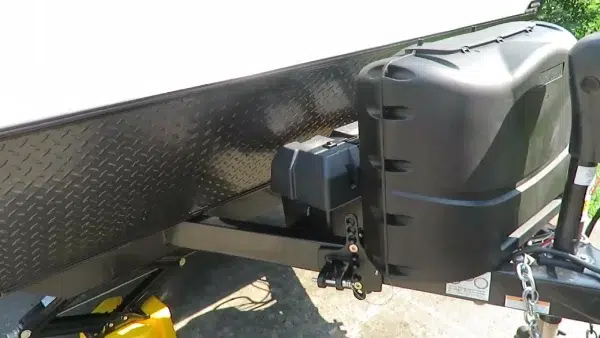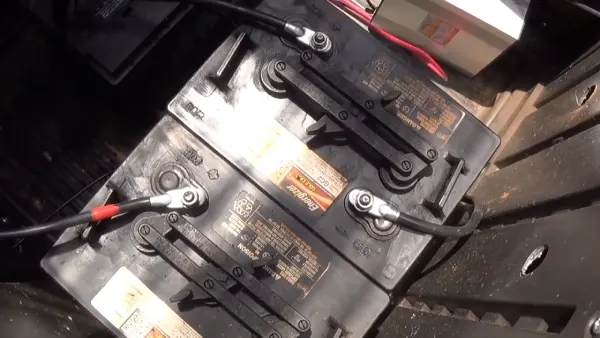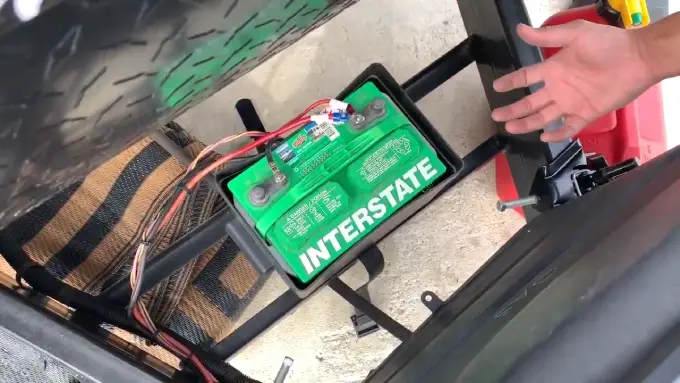Last Updated on June 11, 2023
For those new to RVing, learning about the ins and outs of your rig’s water system can be overwhelming. One commonly asked question is whether the RV water pump runs off battery power.
This is an important question, especially when boondocking or dry camping without access to shore power. You’ll want to know how long your battery will last before it needs to be recharged. To put your mind at ease, the RV water pump indeed runs off battery power.
However, it’s essential to recognize that the water pump can quickly drain your battery if not used efficiently. By following some helpful tips, you can maximize your RV’s battery life while enjoying all the comforts of home on the road.
Does RV Water Pump Run Off Battery: Factors Affecting

The battery lifespan of an RV water pump is a crucial factor to consider when camping or traveling in your recreational vehicle. Understanding the factors that affect the battery life can help you plan your power usage and extend the life expectancy of your battery-operated RV water pump.
Power Consumption
One of the main factors that affects the battery life of your RV water pump is its power consumption. The more powerful the pump, the more energy it will consume, which can drain your battery faster. Choosing a water pump that matches your needs without overloading your battery is essential.
Usage Frequency
Another factor that affects the battery life is how often you use the water pump. Using it frequently or for extended periods will consume more power and drain your battery faster. Conversely, if you use it sparingly and turn it off when not needed, you can conserve power and extend your battery’s life.
Age and Condition
The age and condition of your RV’s battery also play a vital role in its lifespan. If your battery is old or damaged, it may not hold a charge as well as a new one, reducing its overall capacity and lifespan. It’s important to regularly inspect and maintain your RV’s batteries to ensure they are functioning correctly.
Other Factors
Lastly, external factors such as temperature can also impact the lifespan of your RV’s batteries. Extreme temperatures can cause batteries to discharge faster or reduce their overall capacity over time. It’s essential to store and operate your batteries within their recommended temperature range for optimal performance.
Different Types of Power Sources for Your RV Water Pump
There are two main power sources for RV water pumps: battery-powered and electric-powered. Both types have advantages and disadvantages, and the choice of which one to use will depend on your specific needs.
#1 Battery-Powered RV Water Pump
A battery-powered RV water pump is a type of water pump that runs on batteries. It is designed to be used in recreational vehicles (RVs) and other mobile applications where an electrical outlet is not readily available.
#2 Electric-Powered RV Water Pump
An electric-powered RV water pump is another power source for your RV’s water pump. Unlike a battery-powered RV water pump, an electric-powered one uses electricity from an external source to run the pump.
This type of water pump is commonly found in RV parks or campsites with access to electrical hookups. It is also common in larger RVs requiring more water pressure and flow rate than a battery-powered RV water pump can provide.
An electric-powered RV water pump can be more efficient and powerful than a battery-powered one. It can provide higher flow rates and maintain consistent pressure, essential for larger RVs with multiple fixtures.
How Does the Battery-Powered RV Water Pump Run Off Battery?
A battery-powered RV water pump is one of the most common types of RV water pumps that are designed to run off a 12-volt DC battery. This type of water pump is designed to run off the RV’s battery, which means it can be used even when it is not plugged into an electrical outlet.
The way that the battery-powered RV water pump works is quite simple. When you turn on the faucet in your RV, the pump senses the pressure drop and starts pumping water from the freshwater tank through the pipes and out of the faucet. The pump is powered by a 12-volt DC battery, usually located near the pump itself.
One important thing to remember when using a battery-powered RV water pump is that it will drain your RV’s battery over time. The amount of time your battery will last depends on several factors, including how often you use the pump, how long you use it each time, and how fully charged your battery was, to begin with.
How much power does an RV water pump use?

An RV water pump typically uses approximately 5 Amps at 12 volts, which equates to around 60 watts. This level of power consumption is necessary to provide adequate water pressure for various RV plumbing fixtures such as showers, sinks, and toilets.
It’s also worth noting that the power consumption may vary slightly depending on the specific model and brand of the RV water pump.
Does an RV water pump run on a 12V battery?
An RV water pump is designed to operate using a 12-volt power source, typically supplied by the RV’s battery. It is a common practice to wire the water pump to the RV’s 12V electrical system, which in turn draws power from the battery.
This setup ensures that the RV water pump works efficiently and provides the necessary water pressure to various fixtures. It is also essential to check that the RV battery can supply enough power to run the water pump effectively.
What’s the maximum run time of a 12V RV water pump?
Typically, an RV water pump can run continuously for up to 30 minutes. This is because the pump needs to build up pressure in the system, and as long as the water is being used, it will run until the water demand has been satisfied.
However, most RV water pumps come with an automatic pressure switch that will turn the pump off once a certain pressure has been reached. This feature helps conserve battery power and ensures that the pump doesn’t run continuously, preventing potential damage to the pump.
Tips to extend your battery-powered RV water pump Life
To extend the life of your RV water pump, there are several tips you can follow:
- Make sure to check the water level in your battery regularly. A low water level can cause damage to the battery and reduce its lifespan. If the water level is low, add distilled water until it reaches the recommended level.
- Always turn off the RV water pump when not in use. This will prevent the unnecessary drain on the battery and increase its longevity. Turning off the pump when not in use will also prevent any leaks or overflows from causing damage to your RV.
- Consider investing in a high-quality deep-cycle battery for your RV water pump. These batteries are designed for long-term use and can withstand repeated charging and discharging cycles without losing capacity.
- Avoid using too many electrical devices simultaneously while running your RV water pump on battery power. Using multiple devices simultaneously can drain the battery quickly and cause it to wear out faster.
- Keep your RV water pump clean and well-maintained. Regular cleaning and maintenance will ensure that it runs efficiently and uses less power from the battery.
Maximize the Use of Your Battery-Powered RV Water Pump – Proper Care Is Key
The RV water pump can run off a battery if it is a battery-powered model. The battery-powered RV water pump draws power from the RV’s battery system. However, the battery’s lifespan will depend on several factors, such as the size and capacity of the battery, how often the pump is used, and how well it is maintained.
To extend the life of your battery-powered RV water pump, use a high-quality deep-cycle battery specifically designed for RV use. Also, reduce unnecessary water usage to minimize the workload on your pump and conserve energy.
Remember, proper care and maintenance can go a long way in ensuring that your RV water pump serves you well on all your adventures.



